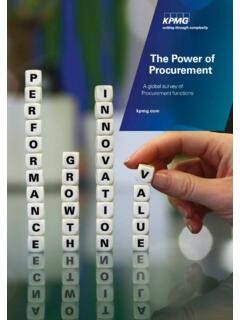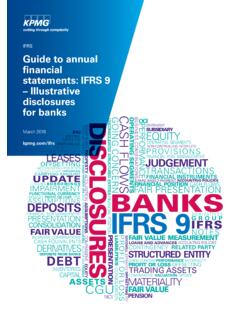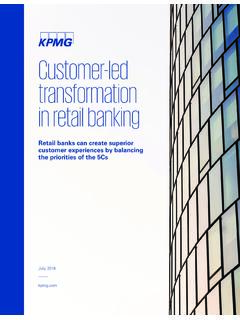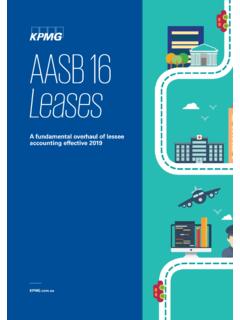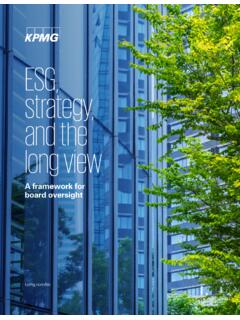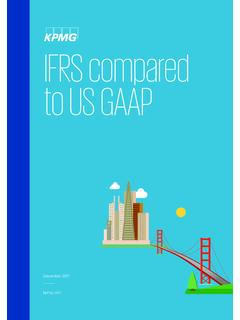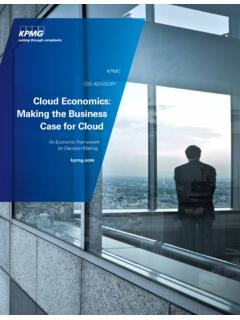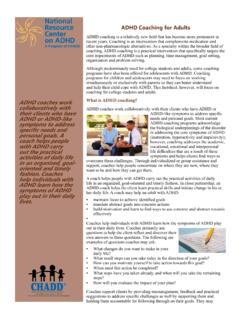Transcription of Talent Development Programmes
1 Talent Development ProgrammesInvesting in Talent Development creates the opportunity for organisations to: develop the organisation s ideal employee, assist employees in achieving their full potential, save on employee turnover costs, and align people to the business strategy. Our Strategic Talent Development Programmes support succession planning, ensure career Development for employees, and increase employee engagement and retention rates. We support organisations in ensuring that they continuously work at closing the skills gap to create a workforce capable of moving the organisation forward in delivering the organisation s business and Change Advisory Services If you want 1 year of prosperity, grow grain. If you want 10 years of prosperity, grow trees. If you want 100 years of prosperity, grow people. About UsAt KPMG People and Change Advisory, we: through our distinctive expertise in organisational psychology and human behaviour at the workplace, we support organisations in achieving enhanced business success through their most valuable asset their people.
2 With a sustained focus on strategy, we advise organisations on people-related matters such as leadership Development , employee engagement, performance management, Talent retention , recruitment, and much more. through this we are able to support organisations in making people decisions that make business to advising clients on any Talent management matter, we take the time to ensure that we fully understand the context and reality our client is operating in. This ensures that any Talent Management Initiative we recommend or implement is truly aligned with our client s business strategy and supports them in achieving their business with the HR function and/or senior management teams to develop and implement contextual Talent Management strategiesDeliver NCFHE accredited courses focusing on enhancing critical skills for the workplace (Further and Higher Education License 2014-FHI-006)Provide employment and employability advice to individuals (Employment Agency License 46-2003)
3 Conduct commissioned research projects for the private and public sector that focus on education, people Development , employment and employabilityContents PageOur Talent Development Programmes5 Our Development Programme Methodology6 Customised Development Programmes7 Competency Development Programmes8 Leadership Programmes8 Off-the-Shelf Development Programmes9 Critical Skills at Work10 Critical Skills for Managers10 Identifying Team Dysfunctions and Measuring Team Performance10 Interpersonal Communication Skills11 Identifying and Addressing Dysfunctional Patterns At Work11 Conducting Professional Interviews and Focus Groups in Marketing Research11 Avoiding Serious Human Errors in Organisations12 Presentation Skills12 Techniques for Motivating Others at Work12 Decision-making through Statistics For Business13 People Management for Young and New Company Leaders13 Organisation Development13 Improving Recruitment And Selection Techniques14 Evaluation of performance.
4 Practices and procedures14 NCFHE Accredited Development Initiatives15 Business Psychology for Managers16 Stepping into Work 16 People and the Organisation17 Coaching and Mentoring17 Train the Trainer18 Skills for Success at Work18 Leadership Skills19 Communication and Presentation Skills19 Working on the Self20 Work Ethics and Employability Skills20 Customer Care21 Applied Basic IT215We offer an array of Talent Development Programmes ; from accredited courses, to fully customised courses. This allows us to cater for our clients individual opting for our courses, organisations may also have the opportunity to benefit from government-issued re-imbursement of training costs through EU-funded grants (eligibility criteria apply).Our Talent Development ProgrammesTalent Development ProgrammesCustomised Development ProgrammesCompetency Development ProgrammesCritical Skills at WorkInterpersonal Communication SkillsPeople and the OrganisationIdentifying and Addressing Dysfunctional Patterns At WorkTrain the TrainerConducting Professional Interviews and Focus Groups in Marketing ResearchLeadership SkillsWork Ethics and Employability SkillsBusiness Psychology for ManagersLeadership ProgrammesCritical Skills for ManagersIdentifying Team Dysfunctions and Measuring Team PerformanceCoaching and MentoringAvoiding Serious Human Errors in OrganisationsSkills for Success at WorkDecision-making through Statistics For BusinessPresentation SkillsOrganisation DevelopmentImproving Recruitment and Selection TechniquesPeople Management for Young and New Company LeadersTechniques for Motivating Others at WorkCommunication and Presentation SkillsCustomer CareEvaluation of
5 Performance, practices and proceduresWorking on the SelfApplied Basic ITStepping into Work Off-the-Shelf Development ProgrammesNCFHE Accredited Development Programmes6 Our Learning philosophy is what makes us different. While there may be an overlap of topics found in other courses on the market, our Talent Development methodology is what makes us unique. Our courses, based on the Learning is for philosophy are reflective, experiential, applied, and support long-term and ongoing Development . In view of this, we utilise a blend of approaches organised in a systematic manner. The approaches include; Simulation-based Development (support insight and motivation, and contribute towards skill Development and real-world practice) Practice-based activities (includes large amounts of practice time, whereby the team will learn by doing ) Action learning (supports insight, motivation, skill Development , real-world practice and accountability).
6 Our Talent Development MethodologyAPPLIEDEXPERIENTIAL REFLECTIVELONG-TERMS essions are designed such that participants cover typical real situations to convey learning are processed to ensure that participants can bridge what they learn with what they are encouraged to develop plans to commit themselves to doing things differently, and we may assist them outside or even after the Development programme is are intended to develop a strong sense of personal awareness within Development Programmes8 Leadership ProgrammesOrganisations do not need to look further than their own workforce for future leaders. With the right Development plans and an early start, tomorrow s leaders can be built today. Unfortunately, due to a variety of factors (such as, lack of time, strategic planning, and finances), it is easy for organisations to fall into the trap of focusing solely on immediate needs and paying less attention to the systemic issues that ultimately drive long-term success.
7 One of those areas is leadership Development . It is essential that organisations invest in the cultivation of future leaders. It is these leaders that are vital to an organisation s long-term health. The best leaders have the skills required to shape the level of engagement in employees. These skills must be developed during the early stages of a future leader s career. This ensures that the individual is immediately in a position to engage their team once they move into formal leadership roles. The Leadership Foundation programme focuses on developing employees with leadership potential and grooming them to take on leadership roles in the future. Participants who have completed the Leadership Foundation Course and have transitioned into leadership positions are now eligible to move into the Leadership Excel Programme with a solid basis in Leadership today s competitive work environment it is essential that organisations ensure that their managers are Effective Leaders.
8 This does not simply imply promoting individuals who possess strong technical skills, rather, in order to be truly effective, leaders must possess the soft skills required to engage, inspire, and motivate others. Whilst we can assume that most managers are highly technically competent in their subject domain, investment is required in order to develop managers horizontally in terms of managerial and leadership attitudes and competencies. Developing these attitudes and competencies in managers will allow the organisation to experience benefits such as increased engagement as well as allow the individual to generate self learning, grow and identify any gaps in their leadership techniques. Ideally, participants would have completed the Leadership Foundation Programme prior to taking on the Leadership Excel Programme. This programme is focused on further developing employees to reach their full potential as leaders now that they occupy a position of leadership within an organisation.
9 This course focuses on building and improving on the foundations laid in the Leadership Foundation Programme and ensures that the organisation is left with competent leaders who will help the organisation move towards achieving its business objectives. Leadership FoundationLeadership ExcelCompetency Development ProgrammesIn today s rapidly changing business environment, capable employees are crucial to organisations success in gaining and sustaining a competitive advantage. This must be achieved against a background of intensified competition, incessant change, a power shift to the customer, collaborations across organisational and geographical boundaries, and a need to maintain high levels of Talent . Whilst employees may be highly technically competent in their subject domain, developing employees horizontally in terms of managerial attitudes and competencies, is essential for the success of the company. This is where Competency Development Programmes (CDP) would factor in and become an effective programme of Development .
10 KPMG People and Change, together with the senior management team of an organisation will identify competencies that they deem essential for its employees to have. These competencies will be specific to the organisation and reflect the specific culture and strategy of the organisation. Once the organisation s competencies are identified employees will be trained in these competencies through a series of Masterclasses, ensuring that each employee is exposed to and trained in those competencies deemed vital to the Programme duration would be tailored to the specific needs and requirements of the Programme duration would be tailored to the specific needs and requirements of the Development Programmes10 Critical Skills at WorkThis programme focuses on equipping participants with practical and critical skills and competencies of how best one can improve working relationships, self-efficacy and performance within the context of one s organisational and performance realities.
